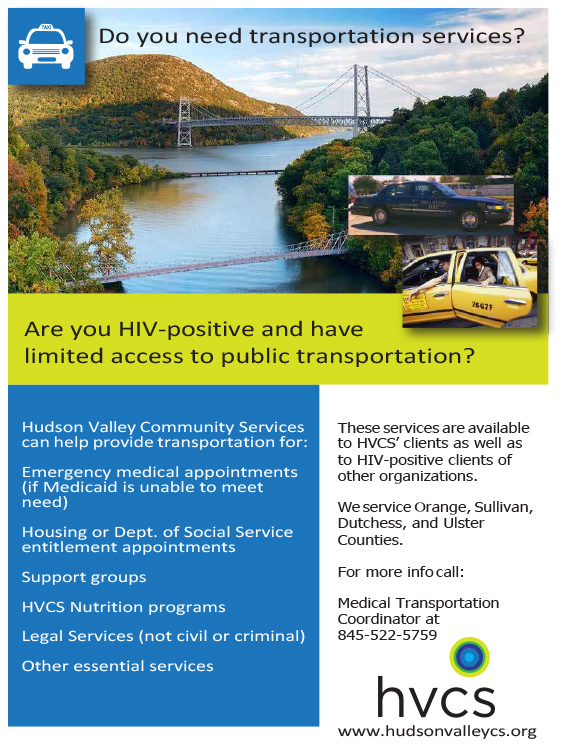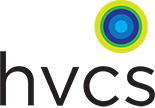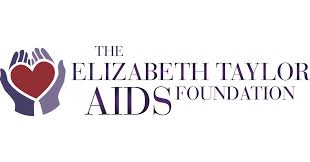Dr. Anthony Fauci to Present on HIV and Aging
Aging with HIV:
Surviving Another Epidemic
A National Webinar for Older Adults with HIV
Thursday, September 17
12-5 pm EST
This webinar will provide older adults with HIV – including Long-Term Survivors – the information they need about aging with HIV in the time of COVID-19, what to ask their physicians, and what action steps to take to live a long and healthy life.
Posts Tagged ‘HIV’
HIV and Aging: Webinar With Dr. Anthony Fauci
Tuesday, September 15th, 2020Transportation Program For HIV+ Individuals
Monday, July 20th, 2020
HVCS In The News: Funding Freeze Puts Squeeze on New York Providers of Social Services
Friday, June 12th, 2020From the Wall Street Journal. View the original article here (paid subscription may be required)
Money is running out to help AIDS patients pay rents; schools are also on edge
Members of the New York City Department of Probation distributed food at a Bronx pantry in late April.
By Jimmy Vielkind
ALBANY, N.Y.—Social service providers say they are struggling as New York’s state government withholds grant payments in response to the novel coronavirus crisis.
Gov. Andrew Cuomo’s budget division froze payments to municipalities and nonprofit agencies, and withheld scheduled raises to some workers in April after revenues crashed as a result of the pandemic.
State revenues are $13.3 billion below expectations, according to the most recent estimate. The state has held up nearly $4 billion of payments, as the Democratic governor pushes Congress for more aid. The state also borrowed $1 billion last month to help it remain solvent until income tax payments, which were previously due in April, start arriving in July. Officials plan to borrow an additional $3.5 billion this week.
As the state holds on to cash, some providers said they are contemplating layoffs and other measures. ACR Health, a Syracuse-based nonprofit that services AIDS patients and others throughout central New York, relies on state grants for almost 88% of its $12 million annual budget, Executive Director Wil Murtaugh said.
Mr. Murtaugh said his group is owed more than $1 million for services that were performed. As a result, ACR has been unable to make rental assistance payments for 221 HIV-positive people in private facilities.
“I don’t think it’s smart to have immunocompromised people be homeless,” Mr. Murtaugh said in an interview. Mr. Cuomo, through an executive order, has put a moratorium on evictions through Aug. 20.
The U.S. House of Representatives, controlled by Democrats, last month approved $1 trillion in additional aid for state and local governments, including $35 billion for New York, as part of a $3 trillion economic relief package.
Republicans who control the Senate, however, are skeptical about sending money to states for expenses they see as unrelated to the pandemic. The Senate is expected to approve another relief bill by the beginning of August, with the size and scope of more assistance to states and municipalities set to be one of the central areas of contention between the parties.
ACR Health is part of a network of New York agencies created in the 1980s in response to the AIDS epidemic. Their mandate has subsequently expanded, said Andrea Straus, executive director of Hudson Valley Community Services Inc.
Her organization has 11 different state contracts that support the work of 71 of the organization’s employees. Ms. Straus said a loan through the federal Paycheck Protection Program has helped her organization avoid layoffs, but it will re-evaluate the situation this summer.
“Our staff are essential, but they’re not going to get paid? It seems so counterintuitive,” Ms. Straus said. “They owe us $908,634.40. And there’s about another $400,000 for May.”
Freeman Klopott, a spokesman for the state Budget Division, said the payment delays could translate into permanent reductions of 20%. “This is exactly why we have been calling on the federal government to provide the resources states need—without federal action, the most vulnerable among us will suffer,” he said.
School districts and municipalities are also on edge. The state was due to release $247 million of aid to Buffalo, Rochester and Syracuse on June 25, but Budget Director Robert Mujica previously told The Wall Street Journal that the grants wouldn’t be released without federal action.
“Uncertainty abounds,” said Peter Baynes, executive director of the New York State Conference of Mayors, which represents city and village leaders.
New York officials did provide clarity this week for road contractors when they allocated $544 million that will be sent to municipalities for paving. Frank Suits Jr., president of the Suit-Kote construction firm based in Cortland, N.Y., said he was preparing to lay off hundreds of workers who normally spend the summer working on road projects. He has now scrapped those plans.
Wyoming County High Superintendent Todd Gadd said even though money isn’t expected until later in the year, municipalities will now execute contracts and fix roads during New York’s limited summer construction season. The state warned, though, that the allocations could be reduced by 20%.
“It’s good we can get projects started, but there’s still that potential cut looming,” Mr. Gadd said.
For other organizations, the payment delays are closer to an annoyance than a cataclysm. Food Pantries for the Capital District, which helps transport food and supplies to 65 pantries in the Albany area, last year received a $15,000 state grant to fund the operation of an additional delivery truck.
Natasha Pernicka, the organization’s executive director, said the state is supposed to reimburse it $970 a month for lease payments. The group has had to eat the cost.
“A lot of organizations don’t have flexibility, and their cash flows are very tenuous,” Ms. Pernicka said. “The intention of donors right now is to pay for Covid response—not because we’re waiting for state payments to come through.”
Aging and Thriving Beyond the Epidemic: Online Listening Forum
Friday, June 5th, 2020Aging and Thriving Beyond the Epidemic
It is critical to underscore the unique role long-term survivors can and do play in ending the epidemic efforts, and the unique challenges they face. This session will focus on these topics. Insight gained from this session will inform ending the epidemic efforts post 2020.
This session will include virtual break-out groups allowing participants to engage in discussion and provide input.
Utilizing a trauma-informed approach, we aim to provide a safe virtual experience for all participants to have open and honest dialogue.
Please know that your participation in the session constitutes your consent to participate. The AIDS Institute will do everything we can to protect your privacy. The information provided will remain confidential and you will not be identified by your answers. Responses will be compiled with no individual responses tied to names or any identifying information.
This session will be recorded for notetaking purposes only. The recording and notes that are taken during this session will be filed in a secure format.
Please keep in mind that your participation is voluntary, and you are free to withdraw from participating at any time.
For free tickets, visit https://www.eventbrite.com/e/aging-and-thriving-beyond-the-epidemic-tickets-104800826092
Webinar Registration for POZ at Home: Coping With COVID-19 and HIV
Friday, May 29th, 2020On Monday, June 1, 2020 at 7:00 pm EST, POZ Magazine is hosting a webinar entitled “POZ at Home – Coping With COVID-19 and HIV.” This webinar is free. Register at https://us02web.zoom.us/webinar/register/WN_WckQRhb3QiOudAY1IoJWJg
This event is being produced by POZ At Home.
Speakers
POZ at Home – Coping With COVID-19 and HIV – Webinar
Friday, May 29th, 2020Hosted by Oriol R. Gutierrez Jr.
HVCS’ Home Test Kit for HIV Program: News Coverage
Friday, May 15th, 2020This week, HVCS unveiled its new policy regarding HIV testing: we will mail an oral swab HIV test kit to your home! Watch the details as our Senior Program Manager, Naomi Kabalkin, explains things to Spectrum News reporter Dominic McKensie:
To receive a free home test kit for HIV, call or text (845) 704-7624 or visit this page.
HIV+ Women’s Art Therapy Group (Conference Call)
Thursday, April 16th, 2020HVCS’ art therapy group for HIV-positive women is now meeting via encrypted conference call. Since this is a virtual support group we cannot create art together but we do offer guided meditation, talk therapy, and support in a trauma-sensitive environment. Three trained group facilitators help run the group. This group is open to new members who are HIV-positive women of any age.
To sign up and find out more, please contact Sarah Polanski at (845) 306-2499.
HVCS’ women’s art therapy groups are supported by a grant from the Elizabeth Taylor AIDS Foundation.
Sex and COVID-19
Monday, March 23rd, 2020We thought it important to share a letter from the New York City Department of Health and Mental Hygiene.
All New Yorkers should stay home and minimize contact with others to reduce the spread of COVID-19. But can you have sex?
Here are some tips for how to enjoy sex and to avoid spreading COVID-19.
1. Know how COVID-19 spreads.
You can get COVID-19 from a person who has it.
The virus can spread to people who are within about 6 feet of a person with COVID-19 when that person coughs or sneezes.
The virus can spread through direct contact with their saliva or mucus.
We still have a lot to learn about COVID-19 and sex.
COVID-19 has been found in feces of people who are infected with the virus.
COVID-19 has not yet been found in semen or vaginal fluid.
We know that other coronaviruses do not efficiently transmit through sex.
2. Have sex with people close to you.
You are your safest sex partner. Masturbation will not spread COVID-19, especially if you wash your hands (and any sex toys) with soap and water for at least 20 seconds before and after sex.
The next safest partner is someone you live with. Having close contact — including sex — with only a small circle of people helps prevent spreading COVID-19.
You should avoid close contact — including sex — with anyone outside your household. If you do have sex with others, have as few partners as possible.
If you usually meet your sex partners online or make a living by having sex, consider taking a break from in-person dates. Video dates, sexting or chat rooms may be options for you.
3. Take care during sex.
Kissing can easily pass COVID-19. Avoid kissing anyone who is not part of your small circle of close contacts.
Rimming (mouth on anus) might spread COVID-19. Virus in feces may enter your mouth.
Condoms and dental dams can reduce contact with saliva or feces, especially during oral or anal sex.
Washing up before and after sex is more important than ever.
Wash hands often with soap and water for at least 20 seconds.
The NYC Health Department may change recommendations as the situation evolves. 3.21.20
Wash sex toys with soap and warm water.
Disinfect keyboards and touch screens that you share with others (for video chat, for watching pornography or for anything else).
4. Skip sex if you or your partner is not feeling well.
If you or a partner may have COVID-19, avoid sex and especially kissing.
If you start to feel unwell, you may be about to develop symptoms of COVID-19, which include fever, cough, sore throat or shortness of breath.
If you or your partner has a medical condition that can lead to more severe COVID-19, you may also want to skip sex.
Medical conditions include lung disease, heart disease, diabetes, cancer or a weakened immune system (for example, having unsuppressed HIV and a low CD4 count).
5. Prevent HIV, other sexually transmitted infections (STIs) and unplanned pregnancy.
HIV: Condoms, pre-exposure prophylaxis (PrEP) and having an undetectable viral load all help prevent HIV. For more information, visit nyc.gov/health and search HIV.
Other STIs: Condoms help prevent other STIs. Visit nyc.gov/health and search STIs.
Pregnancy: Make sure you have an effective form of birth control for the coming weeks. Visit nyc.gov/health and search birth control.
For more information about COVID-19, visit nyc.gov/coronavirus.
New Podcast Episode: Condoms
Wednesday, February 19th, 2020HVCS’ Peer Health Alliance or PHA podcast is fun, open conversation about reducing the risk of sexually transmitted infections and overall sexual health tips for young men ages 13-29 in the LGBTQ community and anyone who wants to know more about staying safe when it comes to sex.
In this episode Steph, Naomi & Andy talk about condoms, condom flavors, lube and more.
Subscribe and listen to more episodes on Spotify, iTunes, your favorite podcast app, or the web.


